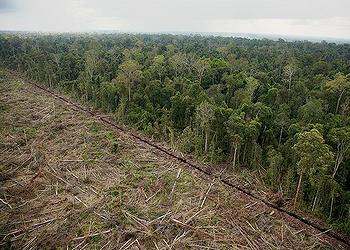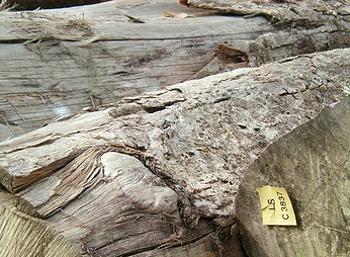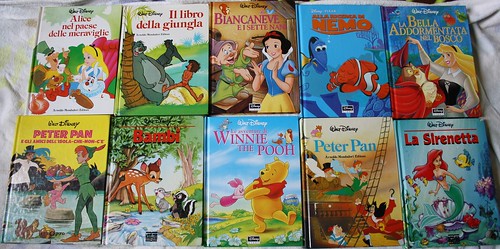迪士尼公司最近宣布新的紙張採購政策,將拒絕使用源自世上任何雨林或侵犯人權的紙張或纖維,並特別點名了印尼。
迪士尼11日發表政策聲明表示,「由於印尼雨林砍伐問題的急迫性,迪士尼公司要求其授權產品製造商避免使用來自印尼、不符合森林管理委員會木材控制標準的紙或纖維。只要還有自然雨林被砍倒,這項政策就會持續。」
娛樂業鉅頭迪士尼是世界上最大的童書及兒童雜誌出版商。它新的全球政策將影響其全球包括中國境內超過1萬家的工廠在內,分佈超過100個國家約2萬5千座工廠。
迪士尼的公民環境及自然保育部副總裁Beth Stevens博士表示,「這項紙張政策是迪士尼以對環境和社會負責的方式開展業務的一個範例。公司對全球生態系及社區承諾給予持久、正向的影響。」
這項政策期望能降低紙張消耗、並排除含有「採收過程不負責」纖維的紙張;舉例說明,來自高保護價值地區纖維即在前述「採收過程不負責」範圍內。
迪士尼公司表示,他們將盡可能使用回收紙、及符合森林管理委員會認證的紙類纖維來源。
環團合作制訂新政策
總部設在加州的非營利組織「雨林行動網路」執行董事Rebecca Tarbotton表示:「我們認為迪士尼在眾多公司中一枝獨秀,證明我們每天使用紙張而不需要去犧牲瀕絕的森林或動物這種精神值得讚揚。」該組織與迪士尼在在這次政策制訂中合作。「由於印尼是目前還在砍伐熱帶雨林作為紙漿的主要地區,這項政策將對印尼影響特別重大。」
根據「雨林行動網路」的資料,印尼是全世界森林砍伐率最高的國家之一,目前國內只剩下1/2的原始林。
 雨林行動網路表示,「保守估計,印尼的雨林每年被清除或喪失達240萬畝。」因而衍生出無限環境與社會問題。爪哇虎已經滅絕、猩猩正瀕臨滅絕。燃燒清除雨林產生濃厚的煙層影響區域空中交通及導致大眾健康問題。農業及工廠排放物污染了土地及水。
雨林行動網路表示,「保守估計,印尼的雨林每年被清除或喪失達240萬畝。」因而衍生出無限環境與社會問題。爪哇虎已經滅絕、猩猩正瀕臨滅絕。燃燒清除雨林產生濃厚的煙層影響區域空中交通及導致大眾健康問題。農業及工廠排放物污染了土地及水。
印尼熱帶雨林的破壞也提高地球的溫度。「雨林行動網路」警告:「雨林及沼澤生態系儲存了數十億噸的碳,對它們的破壞導致碳被排入大氣中。印尼目前是全球三大碳排國,僅次於美國及中國。而印尼排出的碳85%來自雨林及沼澤生態系的退化與喪失。」
由於造紙業,印尼正在失去它們的森林及權益。「雨林行動網路」描述:「產業對土地日益增長的控制嚴重侵犯人權,並造成社區與這些公司間持續的衝突。」
不永續伐木 不僅發生在印尼
世界資源研究所(WRI)Ruth Nogueron表示「全球的森林正面臨多重壓力,迪士尼的行動促進對紙張用量及紙漿供應鍊的認知,該公司瞭解這項議題的嚴重性。」
迪士尼在政策聲明中表示,「對迪士尼而言,自然保育是重要優先事項;我們非常關心由於紙漿需求導致熱帶雨林被清除的議題。」
 迪士尼2011年ˇ月發表的「企業公民報告」(Corporate Citizenship Report)中,其中一個目標為非授權產品及其包裝紙100%來源需是永續的:這些來源包含回收紙、源自經過認證的森林或是來源清楚的。
迪士尼2011年ˇ月發表的「企業公民報告」(Corporate Citizenship Report)中,其中一個目標為非授權產品及其包裝紙100%來源需是永續的:這些來源包含回收紙、源自經過認證的森林或是來源清楚的。
迪士尼下一步將在全公司建立紙類政策,將推展這個目標至所有包含迪士尼人物、商標品牌的授權產品及包裝紙。
此新政策是迪士尼進行中支持森林及自然保育計畫的一部份。
過去20年來迪士尼全球保育基金已經贊助了112個國家的保育項目,包括在印尼執行超過70個項目來保護蘇門答臘雨林及與村莊合作有效的管理森林棲地。
2009年起,迪士尼也投入超過2700萬美元在美國、秘魯、巴西、剛果民主共和國及中國的森林碳排項目上。
華德迪士尼公司的環境政策包含保育水及能源、降低溫室氣體排放、最小化浪費及生態系保育等項目。迪士尼表示,期待他們的政策能激勵他們的員工、演員、訪客及生意伙伴來對環境採取正面行動。
As part of its new paper sourcing policy, the Walt Disney Company has renounced the use of paper and fiber associated with rainforest destruction and human rights violations anywhere in the world – particularly in Indonesia.
“Due to the urgency of the deforestation issues in Indonesia, Disney is asking all its licensees, vendors and suppliers to avoid using paper or fiber from Indonesia that does not meet the Forest Stewardship Council’s Controlled Wood Standard until needed reforms to stop further clearance of natural rainforests are implemented,” the company said in its policy statement, announced on October 11.
The entertainment giant is the world’s largest publisher of children’s books and magazines. Its new global policy will impact nearly 25,000 factories in over 100 countries, including 10,000 factories in China alone.
“The paper policy is an example of how Disney conducts business in an environmentally and socially responsible way, and demonstrates the Company’s commitment to creating a lasting, positive impact on ecosystems and communities worldwide,” said Dr. Beth Stevens, senior vice president, Disney Corporate Citizenship, Environment and Conservation.
The policy aims to minimize the consumption of paper and eliminate paper products containing irresponsibly harvested fiber, such as fiber from High Conservation Value Areas.
Disney says it will also maximize recycled content and fiber sourced from Forest Stewardship Council-certified forestry operations.
The company worked with environmental groups to establish the new policy.
“We commend Disney for adding its significant voice to the growing chorus of companies demonstrating that there’s no need to sacrifice endangered forests or animals for the paper we use every day,” said Rebecca Tarbotton, executive director of the California-based nonprofit Rainforest Action Network, which worked with Disney on the policy.
“This policy will have a particularly important impact in Indonesia, the primary place where rainforests are still being cut down for pulp and paper,” said Tarbotton.
Indonesia has one of the highest deforestation rates in the world, and just under half of the country’s original forest cover now remains, according to the Rainforest Action Network, RAN.
Although estimates vary, RAN says “conservative studies suggest more than 2.4 million acres of Indonesian rainforest is cleared and lost each year.”
Environmental and social problems are the result. The Javan tiger is extinct and the orangutan is endangered. Burning to clear rainforests emits a thick haze of smoke that shuts down regional air traffic and causes public health alerts hundreds of miles away. Pesticides and factory run-off pollute soil and water.
Destruction of Indonesia’s rainforests is raising the planetary temperature. “Rainforest and peatland ecosystems store billions of tons of carbon, and their demolition releases huge emissions into the atmosphere,” warns RAN. “Indonesia is now the world’s third largest emitter of greenhouse gases after the U.S. and China, with 85 percent of its emissions profile coming from rainforest and peatland degradation and loss.”
Indonesians are losing their forests and their rights to pulp and paper companies. “Growing corporate control of land is responsible for serious human rights abuses and persistent conflicts between companies and local communities,” says RAN.
Problems of unsustainable deforestation are not confined to Indonesia.
“The world’s forests are facing multiple pressures,” said said Ruth Nogueron with the World Resources Institute, a think tank based in Washington, DC. “Disney’s actions to better understand its paper usage and supply chain send a positive signal that the company recognizes the seriousness of this issue.”
“Nature conservation is an important priority for Disney, and we are deeply concerned about the ongoing clearance of rainforests for pulp and paper,” Disney says in its policy statement.
In its March 2011 Corporate Citizenship Report Disney published a goal that 100 percent of paper sourced for products and packaging by its non-licensed businesses be sustainable. The paper sourced will contain recycled content, be sourced from certified forests, or be of known source origin.
As a next step Disney is developing a company-wide paper policy that will expand this goal to include all paper associated with licensed products and packaging bearing Disney characters, marks or brands.
The new policy is part of Disney’s ongoing support for forest and nature conservation.
Over the last 20 years, the Disney Worldwide Conservation Fund has invested in conservation programs in 112 countries, including more than 70 projects in Indonesia to protect the Sumatran rainforest and work with villages to effectively manage critical forest habitats.
Since 2009, Disney has also invested more than $27 million in forest carbon projects in the United States, Peru, Brazil, Democratic Republic of Congo, and China.
The Walt Disney Company’s Environmental Policy addresses water and energy conservation; greenhouse gas emissions reduction; waste minimization; and ecosystem conservation.
The company says its policies are intended to inspire Disney employees, cast members, guests, and business colleagues to take positive action for the environment.
※ 全文及圖片詳見:ENS







